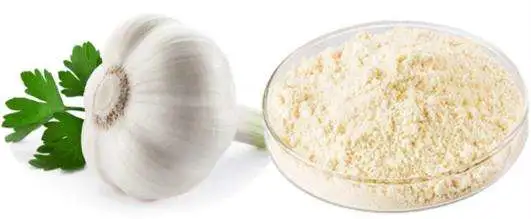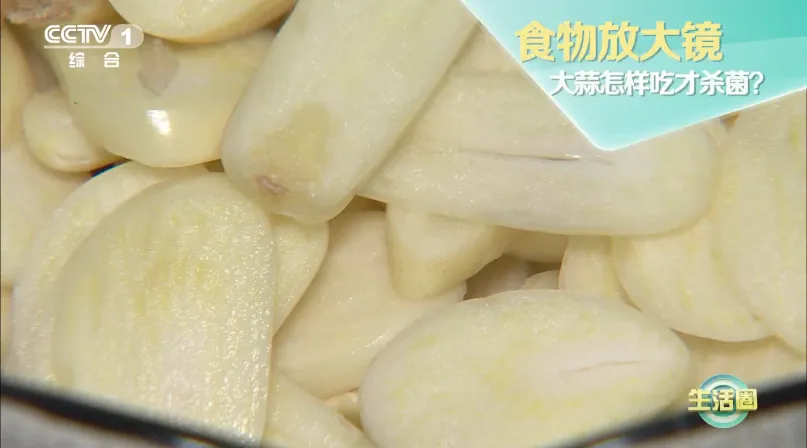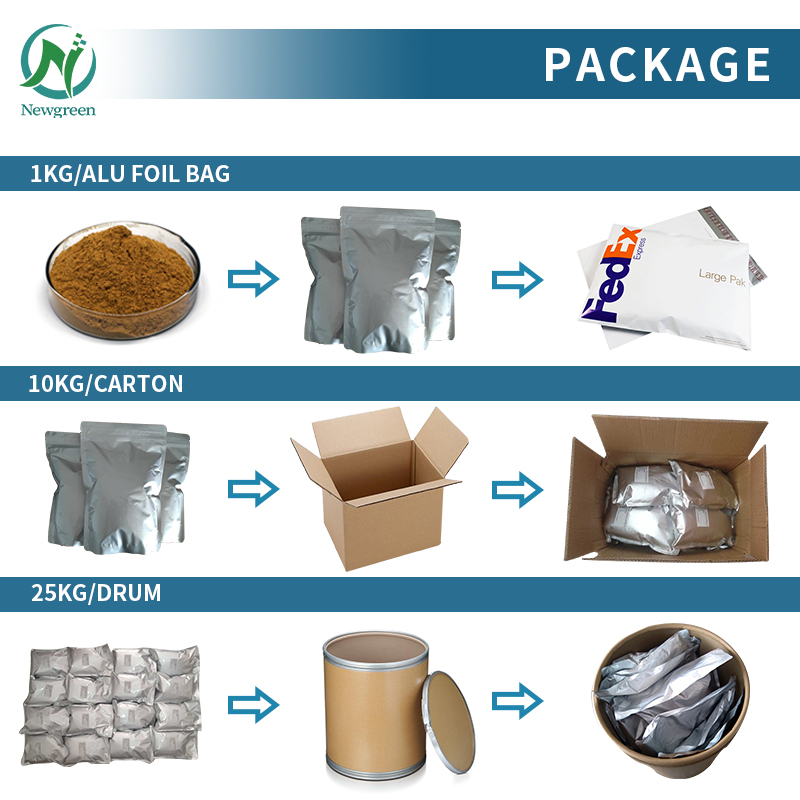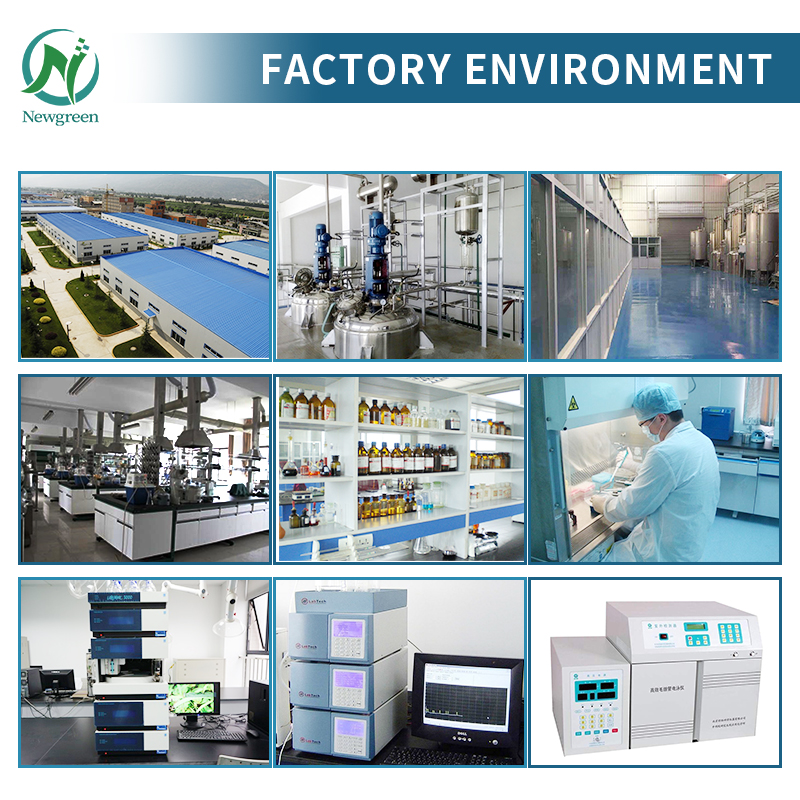Newgreen Supply High Quality 100% Natural Allicin 5% Powder For Fish Feed

Product Description
Allicin, also known as diallyl thiosulfinate, is an organic sulfur compound derived from the bulb (garlic head) of allium sativum, a plant in the lily family, and is also found in Onions and other plants in the lily family. Fresh garlic does not contain allicin, only alliin. When garlic is cut or crushed, the endogenous enzyme in garlic, allinase, is activated, catalyzing the decomposition of allin into allicin.
COA
 |
NEWGREEN HERB CO., LTD Add: No.11 Tangyan south Road, Xi’an, China |
Certificate of Analysis
| Product Name: Garlic Extract | Extract Origin: Garlic |
| Latin Name: Allium Sativum L | Manufacture Date: 2024.01.16 |
| Batch No: NG2024011601 | Analysis Date: 2024.01.17 |
| Batch Quantity: 500kg | Expiration Date: 2026.01.15 |
| Items | Specifications | Results |
| Appearance | Off -White Powder | Complies |
| Particle Size | ≥95(%)pass 80 size | 98 |
| Assay(HPLC) | 5%Allicin | 5.12% |
| Loss on Drying | ≤5(%) | 2.27 |
| Total Ash | ≤5(%) | 3.00 |
| Heavy Metal(as Pb) | ≤10(ppm) | Complies |
| Bulk Density | 40-60(g/100ml) | 52 |
| Pesticide Residue | Meet the requirements | Complies |
| Arsenic(As) | ≤2(ppm) | Complies |
| Lead(Pb) | ≤2(ppm) | Complies |
| Cadmium(Cd) | ≤1(ppm) | Complies |
| Mercury(Hg) | ≤1(ppm) | Complies |
| Total Plate Count | ≤1000(cfu/g) | Complies |
| Total Yeast & Moulds | ≤ 100(cfu/g) | Complies |
| E.Coli. | Negative | Negative |
| Salmonella | Negative | Negative |
| Staphylococcus | Negative | Negative |
| Conclusion | Conform to USP 41 | |
| Storage | Store in a well-closed place with constant low temperature and no direct sun light. | |
| Shelf life | 2 years when properly stored | |
Function
Is it true that allicin is destroyed when heated? How exactly can you make more allicin?

The benefits of allicin
Garlic is very rich in nutrition, including 8 kinds of essential amino acids, rich in a variety of mineral elements, especially germanium, selenium and other trace elements, can improve human immunity and antioxidant capacity. Allicin in garlic has anti-inflammatory, antibacterial and a wide range of anti-tumor activities, to a variety of bacteria, bacteria, fungi and viruses have inhibitory and killing effects. In terms of anti-cancer, allicin can not only inhibit the synthesis of some carcinogens such as nitrosamines in the human body, but also have a direct killing effect on many cancer cells.

How to better retain allicin?
Through the experiment, it was found that the bacteriostatic effect of fresh garlic extract was very obvious, and there was a very obvious bacteriostatic circle. After cooking, frying and other methods, the antibacterial activity of garlic disappeared. This is because allicin has poor stability and will degrade rapidly under high temperature conditions. Therefore, eating raw garlic is the most beneficial to retain allicin.
Is there a relationship between the length of time and how much allicin is produced?
The generation rate of allicin is very fast, and the bactericidal effect of placing for 1 minute is similar to that of placing for 20 minutes. In other words, in the process of our daily cooking, as long as the garlic is mashed as far as possible and eaten directly, it can achieve a good bactericidal effect
Uses
According to the Phytochemicals website, garlic contains many sulfur compounds and phytochemicals, the three most important being alliin, methiin and S-allylcysteine. Together these have been shown to have therapeutic effects, including antibacterial, antifungal, hypolipidemic, antioxidant, anticancer effects and more.
Several different types of garlic supplements are now available. Levels of organosulfur compounds that these supplements provide depends on how they were produced.
Because it has a broad range of biological activities and breaks down to form other organosulfur compounds, allicin uses include:
Fighting infections, due to its antimicrobial activity
Protecting heart health, for example due to its cholesterol- and blood pressure-lowering effects
Potentially helping to protect against cancer formation
Protecting the brain from oxidative stress
Warding off insects and microorganisms
Best Way to Obtain It
The very best way to obtain allicin is from eating fresh garlic that has been crushed or sliced. Fresh, uncooked garlic should be crushed, sliced, or chewed to maximize allicin production.
Heating garlic has been shown to reduce its antioxidant, antibacterial and vascular protective effects, since it changes the chemical composition of sulfur compounds. Some studies have found that during one minute in the microwave or 45 minutes in the oven, a significant amount has been lost, including almost all anticancer activity.
Microwaving garlic is not recommended. However, if cooking garlic it’s best to keep the cloves whole and to either roast, acid mince, pickle, grill or boil the garlic to help retain its nutrients.
Allowing crushed garlic to stand for 10 minutes before being cooked may help increase levels and some biological activity. However, it’s debatable how well this compound can withstand its journey through the gastrointestinal tract once eaten.
Are there any other allicin foods aside from garlic? Yes, it’s also found in onions, shallots and other species in the family Alliaceae, to a lesser extent. However, garlic is the single best source.
Dosage
How much allicin should you take daily?
While dosage recommendations vary depending on someone’s health, the most commonly used doses (such as for supporting cardiovascular health) range from of 600 to 1,200 milligrams per day of garlic powder, usually divided into multiple doses. This should equate to about 3.6 to 5.4 mg/day of potential allicin.
Sometimes up to 2,400 mg/per day may be taken. This amount can typically safely be taken for up to 24 weeks.
Below are other dosage recommendations based on supplement type:
2 to 5 grams/day of garlic oil
300 to 1,000 mg/day of garlic extract (as solid material)
2,400 mg/day of aged garlic extract (liquid)
Conclusion
What is allicin? It’s a phytonutrient found in garlic cloves that has antioxidant, antibacterial and antifungal effects.
It’s one reason why eating garlic is linked to widespread health benefits, like cardiovascular health, better cognition, resistance to infection and other anti-aging effects,
The amount of allicin found in garlic quickly decreases after it’s heated and consumed, therefore it’s described as an unstable compound. However, allicin breaks down to form other beneficial compounds that are more stable.
Garlic/allicin benefits have been found to include fighting cancer, protecting cardiovascular health, lowering oxidative stress and inflammatory reactions, protecting the brain, and naturally fighting infections.
While garlic/allicin side effects are usually not serious, when supplementing with these compounds it’s possible to experience bad breath and body odor, GI issues, and rarely uncontrollable bleeding or allergic reactions.
Package & Delivery



















